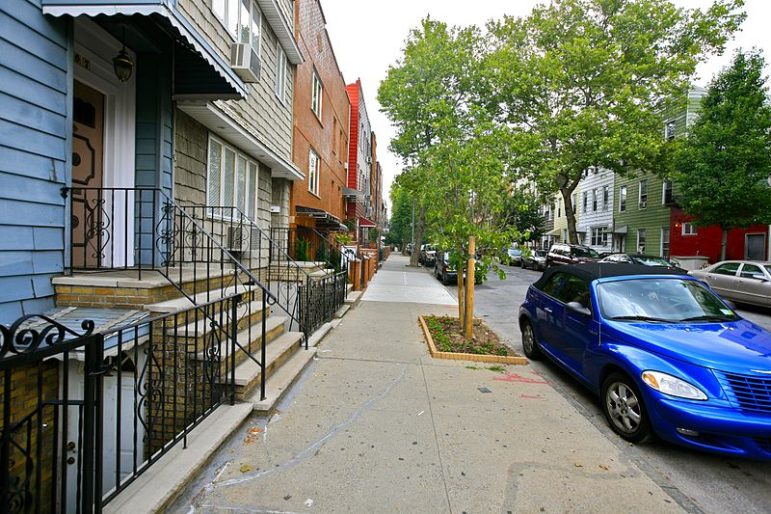
Alex Proimos
One of the organizations involved uses an outcomes-driven initiative and one-on-one coaches to coordinate workforce, education and housing services for low-income families in Williamsburg, Brooklyn, with a special focus on children who need emotional and behavioral supports.
Firmly believing that community-based organizations can best supply multiple services to the poor, the Change Capital Fund (CCF) is investing $5 million in an innovative, four-year program to help local non-profits develop strategies to integrate housing, education and employment services. CCF provides financial support and technical assistance to help these community organizations coordinate program data and services. Grantees have increased cross-programming and built networks to meet the many inter-locking needs of low-income residents.
In the third in a series of briefs evaluating the CCF’s plan, MDRC reported that, largely due to the new silo-busting networks, the four CCF-Funded community organizations made solid gains in Year 2 of the program — finding higher-paying jobs for people without extensive work histories, encouraging first-generation college students to enter school and helping struggling students get back on track.
Since MDRC’s report, outcomes have continued to steadily increase. Grantees served 51 percent more participants than at this point last year. In Year 2, the four sites had 8,598 participants; half way through the current program year they have served 6,944 people. Program referrals, an indicator of increased integration, have increased from 193 in Year 1 to 518 for in the first half of Year 3 and referral completion rates have increased from 53 percent to 83 percent. Grantees have made 787 job placements.
Average wage for those who kept their jobs has climbed from $10.55 to $11.84 to $12.49 in years one through three. 1,638 high school students have been enrolled in college through access programs with 71 percent persisting in Year 3, exceeding national college persistence rates. The grantees have developed 331 affordable housing units.
The groups are: St. Nick’s Alliance, Fifth Avenue Committee, New Settlement Apartments, and Cypress Hills Local Development Corporation.
St. Nick’s Alliance uses its outcomes-driven NABE 3.0 initiative and one-on-one coaches to coordinate workforce, education and housing services for low-income families in Williamsburg, Brooklyn, with a special focus on children who need emotional and behavioral supports. For example, an after-school coach referred one child’s unemployed parent to a workforce coach, who found the parent training and a job. Children receiving coaching have improved school attendance, social and emotional indicators and reading levels.
The Fifth Avenue Committee’s Stronger Together program, in partnership with Brooklyn Workforce Innovations, Red Hook Initiative and Southwest Brooklyn Industrial Corporation, helps public housing residents in Red Hook and Gowanus, Brooklyn find adult education programs, support services, training and jobs. In Year 2 of CCF, 97 adults found jobs after training. One was a 30-year-old without a high school diploma or a steady job. Stronger Together helped that individual earn a high school equivalency credential, prepare for interviews and — for the first time ever — land a job with benefits.
New Settlement Apartments combined programs provided educational services for 2,936 people, including college access and training programs in the Mount Eden neighborhood of The Bronx. New Settlement’s community school celebrated its first graduating senior class, of which 84 percent graduated on time with 95 percent of graduates enrolled in college, far exceeding other South Bronx high schools. NSA has helped 897 students enroll in college with a 79 percent persistence rate.
Cypress Hills Local Development Corporation uses a unique “Cradle to Career” approach to provide a continuum of services at different points of life. These include school readiness for preschoolers, after-school and summer camps for elementary and middle school children, college readiness and counseling for high schoolers and employment services and affordable housing help for adults. In Year 2, it served more than 4,000 individuals, most of whom received education help, more than half of whom took part in college success programs. CHLDC placed 286 young adults in jobs with an average wage of $13.47.
The CCF initiative is showing that cohesive neighborhood-based programs reap big returns. The exact ROI is yet to be determined – grantees are working with an expert to develop financial impact arguments – but clearly, grantees are serving more people with better results.









2 thoughts on “CityViews: Results Show Grassroots Groups Can Make a Dent in Causes of Poverty”
Your reporter certainly likes this grant program. “Silo busting”? Are there hotlinks to the evaluations or other source materials. Where the info came from seems omitted but my eyes may have skipped over the documentation.
Not a reporter, Daniel — CityViews are op-eds.The MRDC report she references is here: http://www.mdrc.org/project/nyc-change-capital-fund-s-economic-mobility-initiative#overview